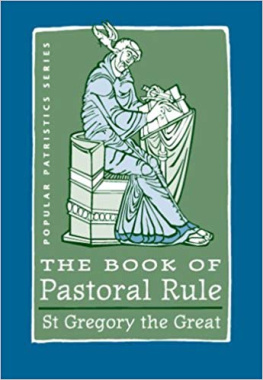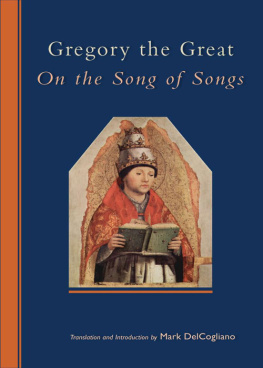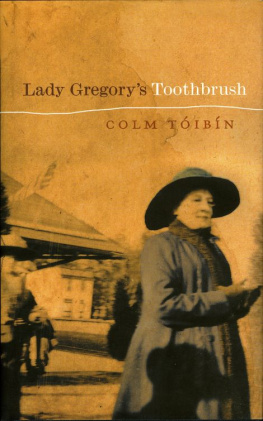St. Gregory the Great - The Book of the Pastoral Rule
Here you can read online St. Gregory the Great - The Book of the Pastoral Rule full text of the book (entire story) in english for free. Download pdf and epub, get meaning, cover and reviews about this ebook. year: 0, genre: Religion / Science. Description of the work, (preface) as well as reviews are available. Best literature library LitArk.com created for fans of good reading and offers a wide selection of genres:
Romance novel
Science fiction
Adventure
Detective
Science
History
Home and family
Prose
Art
Politics
Computer
Non-fiction
Religion
Business
Children
Humor
Choose a favorite category and find really read worthwhile books. Enjoy immersion in the world of imagination, feel the emotions of the characters or learn something new for yourself, make an fascinating discovery.
- Book:The Book of the Pastoral Rule
- Author:
- Genre:
- Year:0
- Rating:3 / 5
- Favourites:Add to favourites
- Your mark:
- 60
- 1
- 2
- 3
- 4
- 5
The Book of the Pastoral Rule: summary, description and annotation
We offer to read an annotation, description, summary or preface (depends on what the author of the book "The Book of the Pastoral Rule" wrote himself). If you haven't found the necessary information about the book — write in the comments, we will try to find it.
The Book of the Pastoral Rule — read online for free the complete book (whole text) full work
Below is the text of the book, divided by pages. System saving the place of the last page read, allows you to conveniently read the book "The Book of the Pastoral Rule" online for free, without having to search again every time where you left off. Put a bookmark, and you can go to the page where you finished reading at any time.
Font size:
Interval:
Bookmark:
The title, Liber Regul Pastoralis, is the one adopted by the Benedictine Edition from several ancient mss ., being Gregory's own designation of his work when he sent it to his friend, Leander of Seville; Ut librum Regul Pastoralis, quem in episcopatus mei exordio scripsi...sanctitati tu transmitterem (Epp. Lib. v., Ep. 49). The previously more usual one, Liber Pastoralis Cur, may have been taken from the opening words of the book itself, Pastoralis cur me pondera fugere, etc. The book was issued (as appears from the passage above quoted in the Epistle to Leander) at the commencement of Gregory's episcopacy, and (as appears from its opening words) addressed to John, bishop of Ravenna, in reply to a letter received from him. But, though put into form for a special purpose on this occasion, it must have been the issue of long previous thought, as is further evident from the fact that in his Magna Moralia, or Commentary on the Book of Job, begun and in a great measure written during his residence in Constantinople, he had already sketched the plan of such a treatise, and expressed the hope of some day putting it into form. For we there find the prologue to the third book of the Regula already written, together with most of the headings contained in the first chapter of that book, followed by the words, And indeed we ought to have denoted particularly what should be the order of admonition with respect to each of these points; but fear of prolixity deters us. Yet, with God's help, we hope to complete this task in another work, should some little time of this laborious life still remain to us (Moral. Lib. xxx. c. 12 and 13).
The book appears to have been estimated as it deserved during the writer's life. It was sent by him, as we have seen, to Leander of Seville, apparently at the request of the latter, for the benefit of the Church in Spain; and there will be found among the Epistles one addressed to Gregory from Licinianus, a learned bishop of Carthagena in that country, in which it is highly praised, though a fear is expressed lest the standard required in it of fitness for the episcopal office might prove too high for ordinary attainment (Epp. Lib. II., Ep. 54). The Emperor Maurice, having requested and obtained a copy of it from Anatolius, Gregory's deacon at Constantinople, had it translated into Greek by Anastasius the patriarch of Antioch, who himself highly approved of it (Epp. Lib. XII., Ep. 24). It appears to have been taken to England by the Monk Augustine. This is asserted by Alfred the Great, who, nearly three hundred years afterwards, with the assistance of his divines, made a translation, or rather paraphrase, of it in the West Saxon tongue, intending, as he says, to send a copy to every bishop in his Kingdom.
Previously to this, there is evidence of the high repute in which the book was held in Gaul. In a series of councils held by command of Charlemagne, a.d. 813viz. at Mayence, Rheims, Tours, and Chlon-sur-Seine the study of it was specially enjoined on all bishops, together with the New Testament Scriptures and the Canons of the Fathers. Similarly at a Council held at Aix-la-Chapelle, a.d. 836. Further, it appears from a letter of Hincmar , Archbishop of Rheims (a.d. 845-882), that a copy of it together with the Book of Canons was given into the hands of bishops before the altar at their consecration, and that they were admonished to frame their lives accordingly.
The work is well worthy of its old repute, being the best of its kind, and profitable for all ages. Two similar works had preceded it. First, that of Gregory Nazianzen (c. a.d. 362), known as his second oration, and called , which was written, like that of the later Gregory, to excuse the writer's reluctance to accept the episcopate, and to set forth the responsibilities of the office. It is obvious, from comparing the two treatises, that the earlier had suggested the later one; and indeed Pope Gregory acknowledges his indebtedness in his prologue to the second book of the Regula. The second somewhat similar treatise had been that of Chrysostom, 'De Sacerdotio,' in six books, c. a.d. 382. It also sets forth the awful responsibilities of the episcopal office; but there are no signs of pope Gregory having drawn from it.
It is to be observed that the subject of all these treatises is the office of episcopacy; not the pastoral or priestly office in its wider sense, as now commonly understood: and it is noteworthy how prominent in Gregory's view of it are the duties of preaching and spiritual guidance of souls. It is regarded, indeed, in the first place as an office of government locus regiminis, culmen regiminis, denote it frequently and hence the exercise of discipline comes prominently in; and the chief pastor is viewed also as an intercessor between his flock and God See e.g. I. 10but it is especially as a teacher, and a physician of souls, that he is spoken of throughout the treatise; as one whose peculiar duty it is to be conversant with all forms of spiritual disease, and so be able to suit his treatment to all cases, to preach the word, reprove, rebuke, exhort, with all long suffering and doctrine, and both by precept and example guide souls in the way of salvation. Gregory had not studied in vain the Pastoral Epistles of St. Paul. Remarkable indeed is his own discriminating insight, displayed throughout, into human characters and motives, and his perception of the temptations to which circumstances or temperament render various people pastors as well as members of their flocks peculiarly liable. No less striking, in this as in other works of his, is his intimate acquaintance with the whole of Holy Scripture. He knew it indeed through the Latin version only; his critical knowledge is frequently at fault; and far-fetched mystical interpretations, such as he delighted in, abound. But as a true expounder of its general moral and religious teaching he well deserves his name as one of the great Doctors of the Church. And, further, notwithstanding all his reverence for Councils and Fathers, as paramount authorities in matters of faith, it is to Scripture that he ever appeals as the final authority for conduct and belief.
Gregory to his most reverend and most holy brother and fellow-bishop, John.
With kind and humble intent you reprove me, dearest brother, for having wished by hiding myself to fly from the burdens of pastoral care; as to which, lest to some they should appear light, I express with my pen in the book before you all my own estimate of their heaviness, in order both that he who is free from them may not unwarily seek them, and that he who has so sought them may tremble for having got them. This book is divided into four separate heads of argument, that it may approach the reader's mind by allegations arranged in order by certain steps, as it were. For, as the necessity of things requires, we must especially consider after what manner every one should come to supreme rule; and, duly arriving at it, after what manner he should live; and, living well, after what manner he should teach; and, teaching aright, with how great consideration every day he should become aware of his own infirmity; lest either humility fly from the approach, or life be at variance with the arrival, or teaching be wanting to the life, or presumption unduly exalt the teaching. Wherefore, let fear temper the desire; but afterwards, authority being assumed by one who sought it not, let his life commend it. But then it is necessary that the good which is displayed in the life of the pastor should also be propagated by his speech. And at last it remains that, whatever works are brought to perfection, consideration of our own infirmity should depress us with regard to them, lest the swelling of elation extinguish even them before the eyes of hidden judgment. But inasmuch as there are many, like me in unskilfulness, who, while they know not how to measure themselves, are covetous of teaching what they have not learned; who estimate lightly the burden of authority in proportion as they are ignorant of the pressure of its greatness; let them be reproved from the very beginning of this book; so that, while, unlearned and precipitate, they desire to hold the citadel of teaching, they may be repelled at the very door of our discourse from the ventures of their precipitancy.
Font size:
Interval:
Bookmark:
Similar books «The Book of the Pastoral Rule»
Look at similar books to The Book of the Pastoral Rule. We have selected literature similar in name and meaning in the hope of providing readers with more options to find new, interesting, not yet read works.
Discussion, reviews of the book The Book of the Pastoral Rule and just readers' own opinions. Leave your comments, write what you think about the work, its meaning or the main characters. Specify what exactly you liked and what you didn't like, and why you think so.











